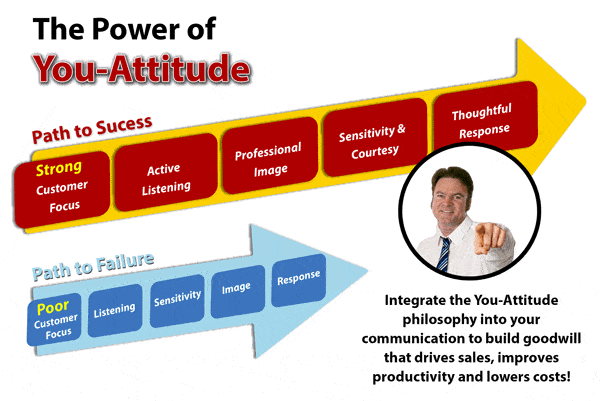In professional practice, goodwill means a responsive, welcoming, cooperative, and trusting feeling or attitude. Goodwill also represents a quantifiable asset that a company earns by offering its customers a value that exceeds the price charged. A business that cultivates goodwill is adept at navigating and avoiding difficult challenges related to providing high-quality customer service.
Benefits of Communicating Goodwill
The benefits gained from goodwill can be extended beyond treating customers well to treating employees well too. Today a growing number of companies recognize that financial and operational gains can accrue by extending goodwill to employees and suppliers. The primary benefit of showing goodwill to employees is lower turnover, which equates to reduced training and hiring costs.
What is a You-Attitude?
When you respond to a customer, co-worker or other stakeholder, your goal is to inform; but you should also focus on building goodwill by conveying competence and awareness that you understand the situation and how to address it. You do this by projecting a you-attitude. Sometimes, this can be tricky when communicating with people who have different cultures and languages. Often it’s best to consult with a certified translation company when communicating with foreign audiences.
You-Attitude + Positive Demeanor + Unbiased Language = Success
Simply put, a “you-attitude,” is a communication strategy and a professional attitude that makes your message recipients the subject of the message. Whether you are communicating in person or by writing, you target their interests and needs, putting them above your own. Conveying a you-attitude means that the tone of the message is positive and free of language that sounds discriminatory or defamatory. By embracing a you-attitude, you create a message that will be perceived as friendly, professional, compassionate and persuasive. A you-attitude also suggests that you care about your customers, your employees and the overall welfare of the market you serve.
Regardless of the content, every message that you send serves to strengthen or weaken the recipient’s perception of yourself and your business. While building goodwill by having a you-attitude is critical, your message also must be delivered professionally. If your message is an e-mail, make sure that it is free of typos and grammatical errors. If you are delivering your message as a speech, make sure to have a professional appearance and delivery. Before you craft a message, analyze your audience carefully and thoroughly to identify their needs, wants, and level of knowledge and role in decision-making about your topic. Such analysis is essential to achieving your own goal.



